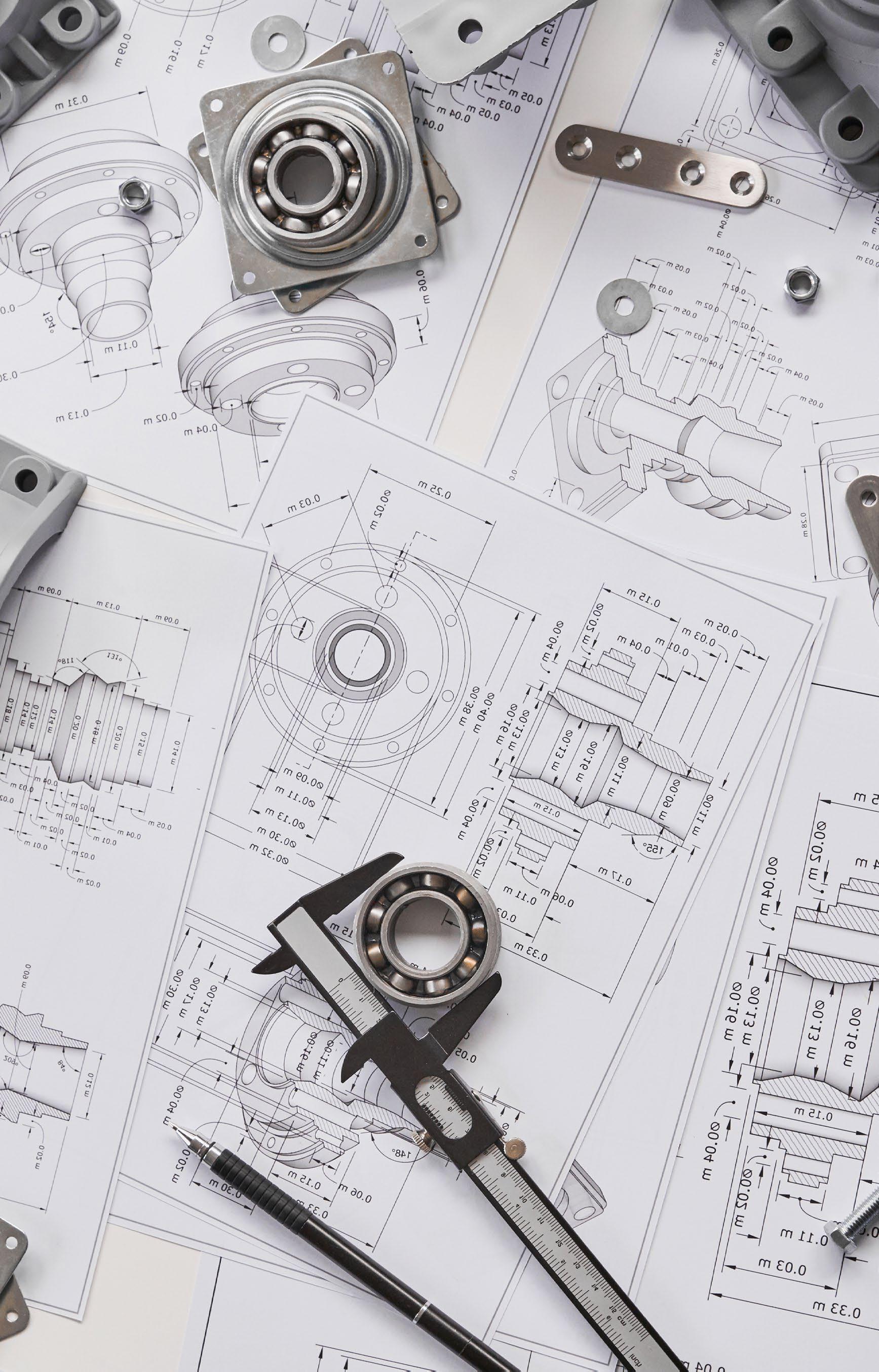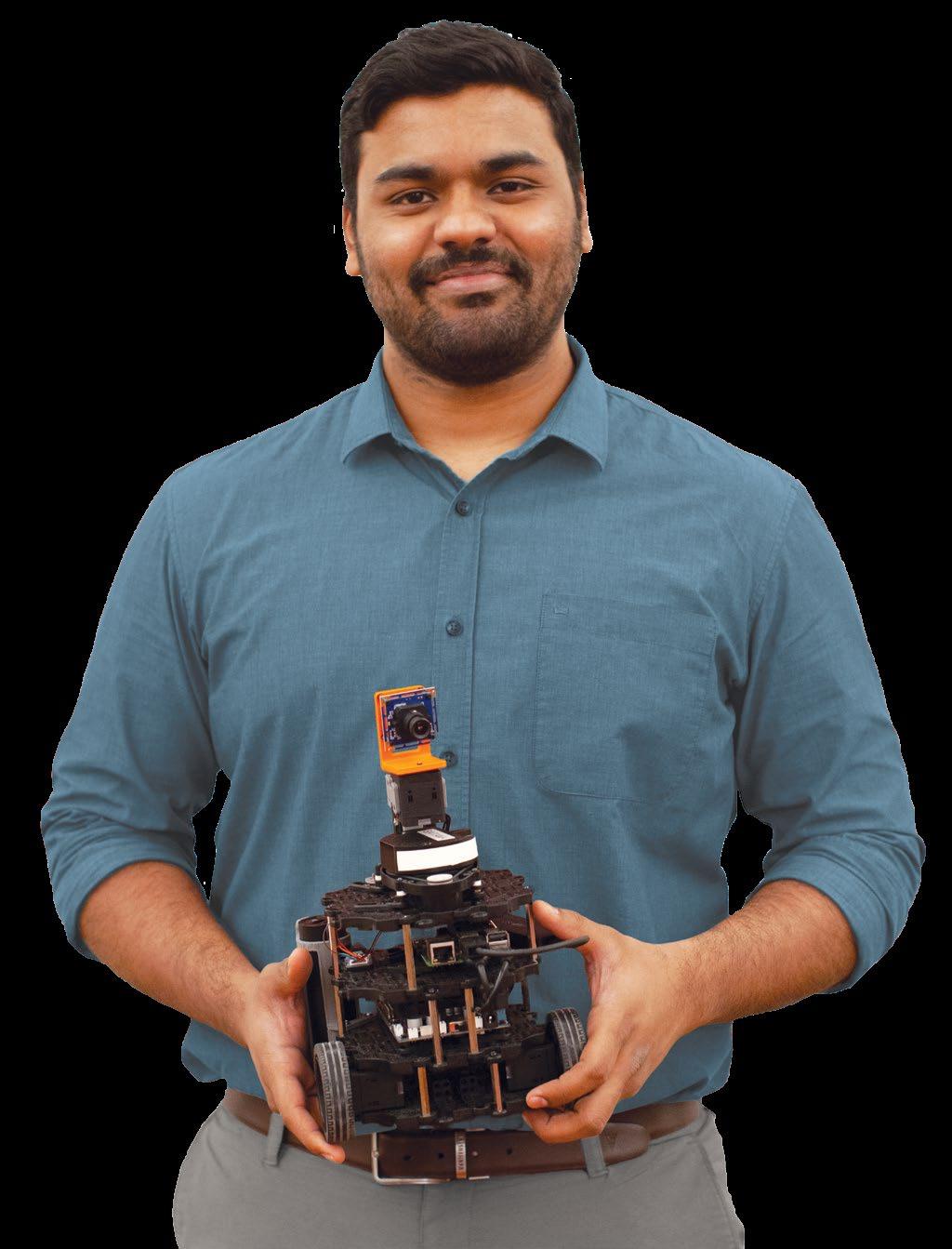
MECHANICAL ENGINEERING AND MECHATRONICS & ROBOTICS
GRADUATE PROGRAMS


GRADUATE PROGRAMS
In graduate programs geared toward applying the advanced principles of physics, design, and material science, students elevate their knowledge of traditional concepts through a multidisciplinary education emphasizing invention and entrepreneurship. Our faculty are renowned international engineers and scientists, pioneering research in areas such as robotics, dynamical systems, and advanced materials.
The MS in Mechanical Engineering program offers a robust study of the physical systems and devices that define modern society. Through hands-on computer and laboratory work in modern facilities, students learn the principles underpinning the discipline and how to apply them in the field. Opportunities are available to conduct research in mechatronics and robotics, computational fluid mechanics, heat transfer, advanced materials, and additive manufacturing. Students can hone their expertise by selecting from four distinct specialties: control and dynamic systems, mechanics and structural systems, fluid mechanics, and energy engineering and policy.
The MS in Mechatronics and Robotics program is an interdisciplinary platform that provides a hands-on education in engineering. It combines the integrated focus on mechanical engineering, control theory, computer science, and electronics that mechatronics encompasses with key elements of robotics including microcontrollers, programming, and mechanisms. Students master the fundamentals of mechatronics and robotics such as modeling methods, hardware components, and interfacing requirements, as well as explore practical applications. Graduates pursue positions in academic, industrial, or entrepreneurial arenas.
Required courses include, but are not limited to, Simulation Tools and Software for Mechatronics and Robotics, Introduction to Robot Mechanics, and Advanced Mechatronics. Students can tailor their studies to specialize in assistive mechatronic and robotic technologies, mobile robotics, or microrobotics.
The PhD in Mechanical Engineering program, offered in both our New York City and Abu Dhabi locations, provides a balanced curriculum and research-centric approach that advances the fundamental understanding in the field of study. Faculty and students conduct pioneering research in developing fields such as composites, mechatronics and robotics, thermo-fluids, and dynamical systems. Doctoral graduates enter research-intensive positions in design engineering and manufacturing, or pursue careers in academia.
A build-your-own master’s degree for an AI-driven world. Work with an advisor to design a curriculum that matches your interests and career aspirations, with concentrations in areas such as cybersecurity, innovation and change management, robotics, user experience and design, machine learning, and more. Leverage AI to shape the future of these fields and your career.
SAI PRASANTH KRISHNAMOORTHY Mechanical Engineering, PhD
Sai works on developing swarms consisting of hundreds of robots for exploring and terraforming extraterrestrial environments such as Mars. Using reinforcement learning and blockchain technology, these robots can autonomously collaborate with each other to explore regions, mine resources, construct structures, farm crops, and prepare the environment for human settlement.

Our graduate students are frequently recognized for their exceptional academic achievements. Recent accolades include:
¢ University-wide Outstanding Dissertation Award, bestowed on a PhD candidate in mechanical and aerospace engineering
¢ American Society for Nondestructive Testing Fellowship Award 2022
¢ American Society for Nondestructive Testing Travel Grant
¢ IEEE Travel Grants


Applied Dynamics and Optimization Laboratory studies energetics of dynamic systems, legged balance and gait stability, and integration of dynamics/control with numerical optimization. It aims to advance the design and control of robots and machines, and the prediction and analysis of biomechanical systems.
ADDITIVE MANUFACTURING
COMPLEX DYNAMICAL SYSTEMS
CONTROLS AND ROBOTIC SYSTEMS
ENERGY AND POLICY RESEARCH
ENERGY SYSTEMS
HEALTH ENGINEERING
Applied Micro-Bioengineering Lab develops innovative micro/ nanoscale technologies and integrated biosystems, and applies them to emerging areas at the intersection of engineering and medicine. The research focus includes cancer biology, immune engineering, tissue engineering, and stem cell-based regenerative medicine.
Automation and Intelligence for Civil Engineering Laboratory advances automation and intelligence technologies through civil and mechanical engineering applications. Areas of research include robotics, computer vision, machine learning, and artificial intelligence.
Composite Materials and Mechanics Laboratory specializes in lightweight composites, biomaterials, and smart materials. Current research is being conducted on additive manufacturing of composite materials and machine learning in materials characterization.
Dynamical Systems Laboratory conducts fundamental research in the theory and application of dynamical systems, motivated by the objectives of advancing engineering science and improving society. The theoretical expertise of the lab is in controls, networks, nonlinear dynamics, and time series, while the application domain is in modeling and analysis of physical, social, and technical systems.
Machines in Motion Laboratory aims to understand the fundamental algorithmic principles of robotic movements to create truly autonomous machines. Current research projects include legged locomotion and object manipulation using optimal control and reinforcement learning.
Mechatronics, Controls, and Robotics Laboratory focuses on the convergence of frontier technologies (e.g., robotics, artificial intelligence, augmented/virtual reality, and blockchain) with applications to natural and intuitive human-robot interaction, digital health, and STEM education.
Medical Robotics and Interactive Intelligent Technologies (MERIIT) Lab is where researchers develop and implement artificial intelligence, advanced control systems, signal processing algorithms, and smart mechatronic modules to augment human capabilities. A particular focus of the lab is interactive neuro-rehabilitation and surgical robotic systems.
MACHINE LEARNING AND AUTONOMY
SMART MATERIALS
Micro/Nano Biosensing Device and Instrumentation Lab specializes in the development of cutting-edge, on-chip biosensor devices integrated in a micro/nanoscale fluidic system, along with their accompanying automated instruments. These devices utilize a range of transduction mechanisms, including mechanical, optical, electrical, and biochemical, to enable fast, highly sensitive, point-of-care screening and diagnosis of immune disorders and acute inflammations resulting from infection, injury, surgery, and immunotherapy.
MakerSpace is a 10,000-square-foot collaborative space equipped with a vast array of resources including 3D printers, integrated manufacturing facilities, advanced software, and milling machines. Students from a wide range of disciplines throughout all of NYU connect here to innovate and create.
From industry giants to fast-paced startups, the most competitive companies in the world seek NYU Tandon School of Engineering graduate students.
Graduate students have access to powerful resources to help prepare them for the next step in their careers. New York University’s Wasserman Center for Career Development and the Office of Career Services on the NYU Tandon campus provide interview guidance, networking connections, and more.
Amazon Robotics
Apple
BeeHex
Boeing
Con Edison
Desktop Metal
General Dynamics
Electric Boat
General Motors
Hirebotics
Honda
Honeywell
Lockheed Martin
Naval Air Warfare
Center Aircraft
Division Lakehurst
Siemens
SpaceX
Tesla
Top Academic Institutions
A sampling of top companies and agencies hiring our graduates
Weiqiang Chen
Applied Micro-Bioengineering Laboratory
Nikhil Gupta
Cybersecurity in Manufacturing, and Advanced Lightweight Composite Materials
Composite Materials and Mechanics Laboratory
Katsuo Kurabayashi
Micro/Nano Biosensing Device and Instrumentation Lab
Maurizio Porfiri
Dynamical Systems Laboratory
Katepalli R. Sreenivasan
Turbulence, Computations, AI, and Machine Learning
Visit our department webpage grad.engineering.nyu.edu/ mae-faculty
S. Farokh Atashzar
Medical Robotics and Interactive Intelligent Technologies
Chen Feng
Automation and Intelligence for Civil Engineering Lab
Vikram Kapila
Applications of Mechatronics and Robotics to Range of Motion
Measurements and Natural
Human-Robot Interaction
Mechatronics, Controls, and Robotics Laboratory
Joo H. Kim
Energetics of Robotic Systems, Robotic Balance and Gait Stability, and Integration of Robot Dynamics/ Control with Numerical Optimization
Applied Dynamics and Optimization Laboratory
Ludovic Righetti
Machines in Motion Lab
ADMISSION INFORMATION
1.646.997.3182 engineering.gradinfo@nyu.edu
LEARN MORE AND APPLY engineering.nyu.edu/mae
LEARN MORE ABOUT TANDON grad.engineering.nyu.edu/info
The best and brightest from around the world apply for admission to the NYU Tandon School of Engineering.
APPLICATION REQUIREMENTS
grad.engineering.nyu.edu/requirements
START YOUR APPLICATION grad.engineering.nyu.edu/apply
DEPARTMENT GRADUATE PROGRAM ADVISER
BRIAN MCNIFF
bm3155@nyu.edu
DEPARTMENT PHD PROGRAM ADVISER
JOO H. KIM
joo.h.kim@nyu.edu